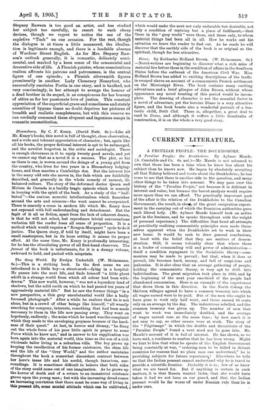.Bloomsbury. By C. F. Keary. (David Nutt. 6s.)—Like all Mr.
Keary's books, this novel is full of thought, close observation, and a wide and tolerant appreciation of character; but, again like all his books, the proper fictional interest is apt to be submerged, and the novelist forgotten in the critic and sociologist. There is enough cleverness in it to equip twenty good novels, and yet we cannot say that as a novel it is a success. The plot, so far as there is one, is woven around the doings of a young girl from the country, who lives for two years in a Bloomsbury lodging- house, and then marries a Cambridge don. But the interest lies in the many odd sets she moves in, the fads which are faithfully described, and generally in the whole comedy of earnest, ill- balanced culture. The story of the deformed doctor Quern and Miriam de Cassada is a luridly tragic episode which is scarcely in keeping with the spirit of the book. As a study of the "half- baked "—the curious neurotic intellectualism which flourishes around the arts and sciences—the work cannot be overpraised. There is scarcely a craze in modern life which Mr. Keary does not expound with full understanding and detachment. But the faplt of it all as fiction, apart from the lack of coherent drama, is that he will not select, but reproduces trivial conversations verbatim till the reader loses all sense of proportion. It is a method which would require a " Rougon-Macquart " cycle to do it justice. The Quorn story, if told by itself, might have been a small masterpiece, but in its loose setting it misses its proper effect. At the same time, Mr. Keary is profoundly interesting, for he has the stimulating power of all first-hand observers. The format of the book is unfortunate, for it is a dumpy volume, awkward to hold, and packed with misprints.










































 Previous page
Previous page